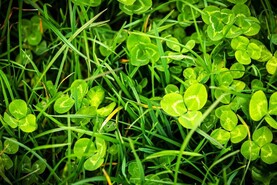Glanbia Ireland has warned milk suppliers to be on the lookout for bloat and nitrates poisoning following an incident in the southeast in which 15 cows died.
It is understood that the cows died after grazing reseeded ground on which fertiliser had been recently spread.
It was initially thought that the cause of death was bloat, but blood samples taken from the dead animals showed that nitrates poisoning was the primary factor – although bloat was a contributory issue.
Nitrates poisoning occurs where nitrates are taken up by plants faster than they can be converted into protein and thereby build up in the herbage.
The nitrates are converted to nitrite in the rumen of the cows. This then binds to haemoglobin in the blood, stopping the haemoglobin from carrying oxygen. Death then occurs rapidly.
Reseeded ground
In the recent incident, the cows were grazing reseeded ground that had a good mix of grass and clover.
Fertiliser was spread on the paddock the day before the cows grazed the ground.
The cows were fine after the first grazing. However, 15 were found dead in the paddock after the second grazing.
Subsequent analysis of blood samples from the cows confirmed that the cause of death was nitrates poisoning.
Fast-growing herbage
It is believed that the animal deaths resulted from a combination of lush fast-growing herbage, the recent fertiliser application and high grass intakes, as the cows had been kept tight on grazing the previous day.
It is understood that the cows included 14 first-calvers and one second-calver.
Insurance generally does not cover cow deaths caused by bloat or nitrates poisoning.
Meanwhile, a management notice from Glanbia Ireland advised milk suppliers to be on the look-out for both nitrate poisoning and bloat. The signs of nitrate poisoning include:
Staggering (like cows are drunk) due to lack of oxygen to the brain.Muscle tremors.Rapid fast breathing (to try to get more oxygen).Cows may salivate and froth at the mouth. Bluish or chocolate brown colour of the mucous membranes.Recumbent animals, can be large numbers at a time, death can occur through suffocation relatively quickly.A cow can consume a toxic amount of nitrates in one hour and will start to show signs very quickly thereafter.
Call your vetIt advised that farmers who suspect their cows may have nitrates poisoning to call their vet immediately and outline the number of animals that could be affected.
Any animals still able to walk should be removed from grass and given a different source of forage such as hay, together with a low-protein/high-energy concentrate.
A similar approach is recommended for bloat. All affected animals should be seen by a vet, the management notice advised, to diagnose frothy bloat and alleviate any gas build-up in the rumen.
All affected animals should receive oral supplementation of vegetable oil (250ml to 500ml/cow) or a specific anti-bloat agent through the drinking water.
The stock should be removed from pasture and put on to a high fibre diet (hay or straw), together with a low protein/high energy concentrate. The paddocks that caused the problem should not be grazed for at least 10 days.
Glanbia Ireland has warned milk suppliers to be on the lookout for bloat and nitrates poisoning following an incident in the southeast in which 15 cows died.
It is understood that the cows died after grazing reseeded ground on which fertiliser had been recently spread.
It was initially thought that the cause of death was bloat, but blood samples taken from the dead animals showed that nitrates poisoning was the primary factor – although bloat was a contributory issue.
Nitrates poisoning occurs where nitrates are taken up by plants faster than they can be converted into protein and thereby build up in the herbage.
The nitrates are converted to nitrite in the rumen of the cows. This then binds to haemoglobin in the blood, stopping the haemoglobin from carrying oxygen. Death then occurs rapidly.
Reseeded ground
In the recent incident, the cows were grazing reseeded ground that had a good mix of grass and clover.
Fertiliser was spread on the paddock the day before the cows grazed the ground.
The cows were fine after the first grazing. However, 15 were found dead in the paddock after the second grazing.
Subsequent analysis of blood samples from the cows confirmed that the cause of death was nitrates poisoning.
Fast-growing herbage
It is believed that the animal deaths resulted from a combination of lush fast-growing herbage, the recent fertiliser application and high grass intakes, as the cows had been kept tight on grazing the previous day.
It is understood that the cows included 14 first-calvers and one second-calver.
Insurance generally does not cover cow deaths caused by bloat or nitrates poisoning.
Meanwhile, a management notice from Glanbia Ireland advised milk suppliers to be on the look-out for both nitrate poisoning and bloat. The signs of nitrate poisoning include:
Staggering (like cows are drunk) due to lack of oxygen to the brain.Muscle tremors.Rapid fast breathing (to try to get more oxygen).Cows may salivate and froth at the mouth. Bluish or chocolate brown colour of the mucous membranes.Recumbent animals, can be large numbers at a time, death can occur through suffocation relatively quickly.A cow can consume a toxic amount of nitrates in one hour and will start to show signs very quickly thereafter.
Call your vetIt advised that farmers who suspect their cows may have nitrates poisoning to call their vet immediately and outline the number of animals that could be affected.
Any animals still able to walk should be removed from grass and given a different source of forage such as hay, together with a low-protein/high-energy concentrate.
A similar approach is recommended for bloat. All affected animals should be seen by a vet, the management notice advised, to diagnose frothy bloat and alleviate any gas build-up in the rumen.
All affected animals should receive oral supplementation of vegetable oil (250ml to 500ml/cow) or a specific anti-bloat agent through the drinking water.
The stock should be removed from pasture and put on to a high fibre diet (hay or straw), together with a low protein/high energy concentrate. The paddocks that caused the problem should not be grazed for at least 10 days.






 This is a subscriber-only article
This is a subscriber-only article











SHARING OPTIONS: